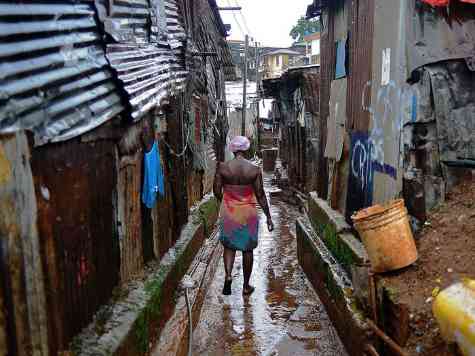Take up the White Man’s burden–
The savage wars of peace–
Fill full the mouth of Famine
And bid the sickness cease;
And when your goal is nearest
The end for others sought,
Watch sloth and heathen Folly
Bring all your hopes to nought.
Nothing better encapsulates President Barack Obama’s foreign policy than the glaring contrast Tuesday between his adamant refusal to send ground troops to confront the threat of the Islamic State terror group, on the one hand, and his sudden announcement that he would be sending 3,000 troops to Liberia to help that country contain its deadly Ebola outbreak, on the other.
The Ebola outbreak has not–as of yet–attacked Americans outside the region. It is a deadly threat, to be sure, but still a potential one. At this point, Islamic State (or ISIS, or ISIL) has already beheaded Americans and threatened to kill more–along with the Christians, Yazidis, Shiites, and others it has slaughtered. And yet Obama is painfully eager not to send troops to fight.
There is no reason why we cannot tackle both threats. Indeed, our military is far better equipped to destroy ISIS than to heal an epidemic. And while we struggle to cobble together a regional coalition in the Middle East, there already is an institution in Africa–the African Union–that is capable of providing the kind of assistance that U.S. troops will be deploying to Libera to offer.
So the question is: why Liberia, but not Iraq?
One obvious answer is that Americans are against committing ground troops to another Middle East war, but might not oppose a humanitarian mission. The Ebola virus causes terrible suffering, after all, but at least it is not shooting at us, and the local population is likely to welcome U.S. intervention rather than resisting it (for now).
The other answer, however, is that humanitarian missions are just about the only use of force that Barack Obama–or, indeed, any liberal Democrat–will consider, at least when it comes to using large numbers of troops. (The same was largely true of Bill Clinton.)
Even the Libya war, where Obama insisted on “leading from behind,” was sold on the basis of preventing atrocities.
But again, why Liberia in particular?
There are certainly other humanitarian crises in Africa–some partly of our own making, especially across the Maghreb, where the collapse of Ghadafi’s forces unleashed heavily-armed Islamists. Nearby, in Nigeria, is the awful Boko Haram, which the U.S. has done little to help fight, save for deploying a few high-minded Twitter hashtags.
The reason may lie in Liberia’s unique connection to the United States. Founded by freed slaves, it is one of America’s only colonial projects, its cities named for nineteenth-century U.S. presidents.
Post-colonialism looms large in Obama’s thinking. Influenced by Columbia’s Edward Said as a student, as a president he has often strained to govern in anti-colonialist fashion.
That means abandoning traditional American allies, such as Israel or the Egyptian regime of Hosni Mubarak, and showing favor to third-world upstarts like Venezuela, or to Islamist groups like the Muslim Brotherhood. Above all, it means avoiding the Orientalist pitfall of “essentializing” the “Other”–hence Obama’s reluctance to acknowledge radical Islam as the source of terror.
In Liberia, Obama may also see a rare opportunity to redress decades of American neglect. After all, if the country’s health system is inadequate to the challenge, is that not, from a post-colonial perspective at least, America’s fault?
Yet, as Scott Gottlieb and Tevi Troy point out in today’s Wall Street Journal, Ebola is not just a local Liberian problem, but a regional one.
It is also worth asking what, exactly, our troops will be doing in Liberia. The president says they will be providing “logistics.” All well and good–but perhaps too little, too late.
The truth may be that there is no way to stop Ebola except to stop its victims from leaving. Obama may be returning to the land of free slaves only to quarantine them.
Kipling would have understood.

COMMENTS
Please let us know if you're having issues with commenting.